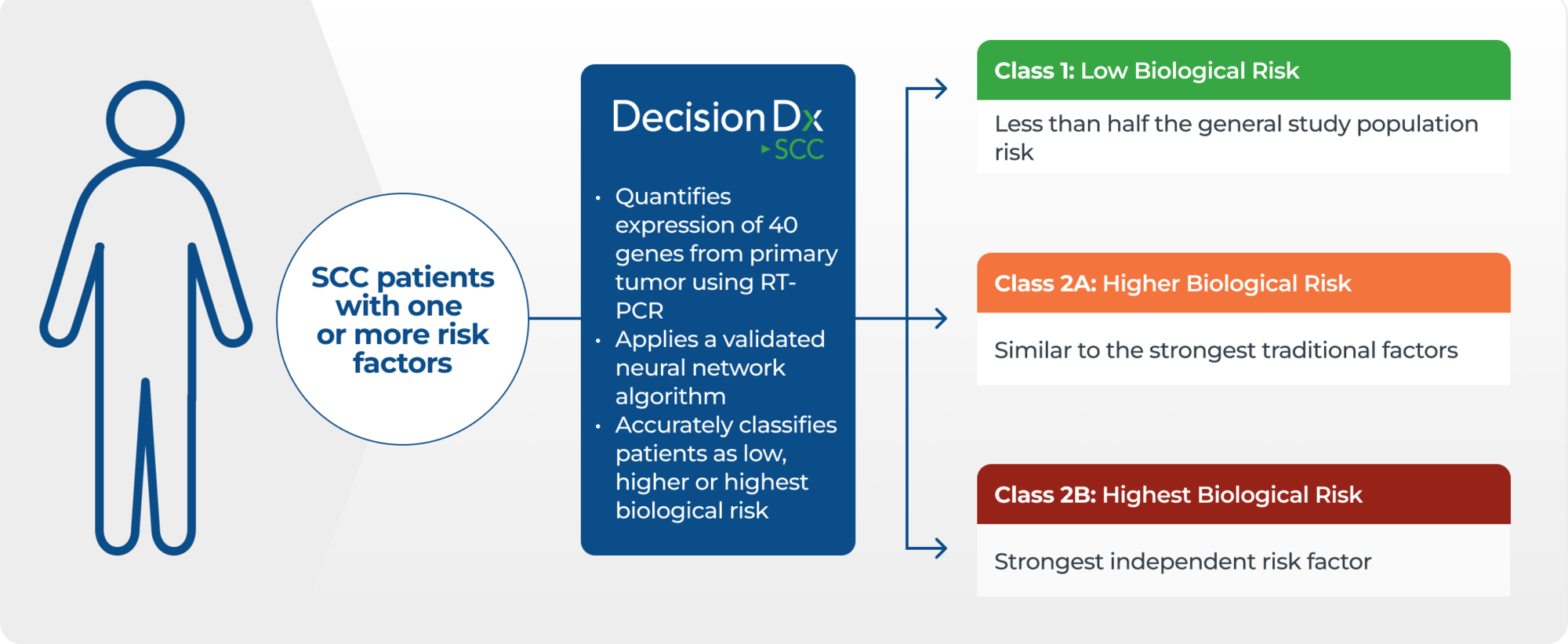
Accurate prognostic data to inform the most appropriate care for your patients
DecisionDx-SCC is the strongest independent predictor of cutaneous squamous cell carcinoma (SCC) metastasis.1
Informing risk-appropriate patient management
Whether you’re determining your surgical approach or establishing next steps after the procedure, make sure you have the most valuable prognostic data available.
DecisionDx-SCC is a Gene Expression Profile test developed to predict nodal and distant metastatic risk for SCC patients with one or more high-risk factors, based on the biologic profile of 40 genes within their tumor tissue.


DecisionDx-SCC is clinically validated in nearly 1,000 patients in an initial validation study and a performance validation study, and supported by 17+ peer-reviewed publications.1,6
More than 3,500 clinicians have ordered DecisionDx-SCC*
Intended Use: DecisionDx-SCC is indicated for patients diagnosed with cutaneous squamous cell carcinoma (SCC) and one or more risk factors.7,8 The personalized class results complement current staging methods commonly used for risk assessment.
*Castle Biosciences data on file



The test provides an accurate and comprehensive result with higher positive predictive value (PPV) than traditional staging, adding valuable prognostic information that is multiplicative to existing risk seen in clinicopathologic risk factors.1

Risk Factors:
Surgical and Pathological Findings
- Perineural involvement:
- Large ( ≥ 0.1 mm) or named nerve involvement
- Small (≤ 0.1 mm) in caliber
- Poorly differentiated tumor histology
- Depth:
- Invasion beyond subcutaneous fat
- Invasion depth ≥2 mm
- Aggressive histologic subtypea
- Lymphovascular invasion
- Desmoplastic SCC
-
DecisionDx-SCC is not intended for use with locally recurrent tumor tissue.
a) Acantholytic (adenoid), adenosquamous (showing mucin production), or carcinosarcomatous (metaplastic) subtypes7 (others8 will be considered on a case-by-case basis)
Case study:
Two real-world Mohs-treated patients had similar risk factors but very different outcomes. When applying the DecisionDx-SCC gene expression profile test, the limitations of traditional risk factors and staging methods become apparent.9

Understaging poses challenges for clinicians and their patients
35% of cases with metastasis are under-called by staging and can lead to an unforeseen metastasis in an otherwise low-risk cSCC patient.4
By using DecisionDx-SCC with or without traditional staging, you can:
- Ensure your patient's underlying risk of metastasis is appropriately identified
- Deliver personalized treatment to each patient based on their underlying tumor biology and considering their own demographics
- Contribute to patients’ and systems’ healthcare savings
- Improve overall patient management through personalized medicine
What are my next steps?
Learn more about ordering a test.


Inform decisions,
improve care.
Learn more about integrating DecisionDx-SCC into your practice
Find out more about Castle Biosciences
Talk to your doctor to determine if the DecisionDx-SCC test is right for you.
1. Ibrahim et al. Future Oncology 2021.
2. Goldberg et al. Presented at Winter Clinical Dermatology. January 14-19, 2022.
3. SEER Data Release 2019.
4. Mansouri B et al. JAMA Dermatology 2017.
5. Farberg et al. Dermatology and Therapy 2022.
6. Wysong et al. Dermatology and Therapy 2024.
7. NCCN Guidelines for Squamous Cell Skin Cancer, v1. 2024.
8. Connolly SM et al. JAAD 2020.
9. Au et al. Dermatology and Therapy 2021.
Copyright ©2024 Castle Biosciences

